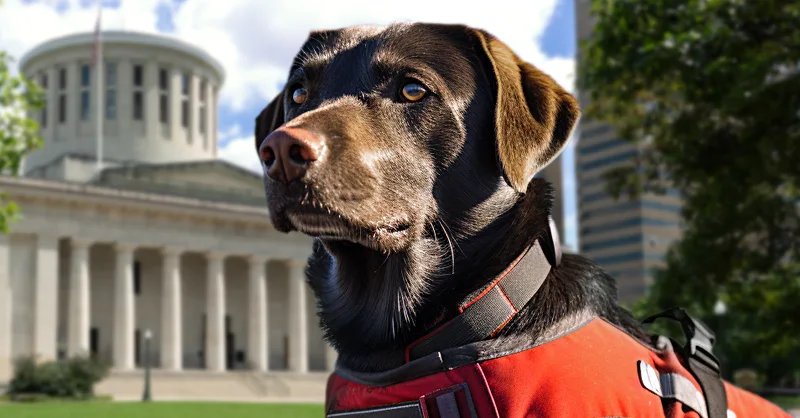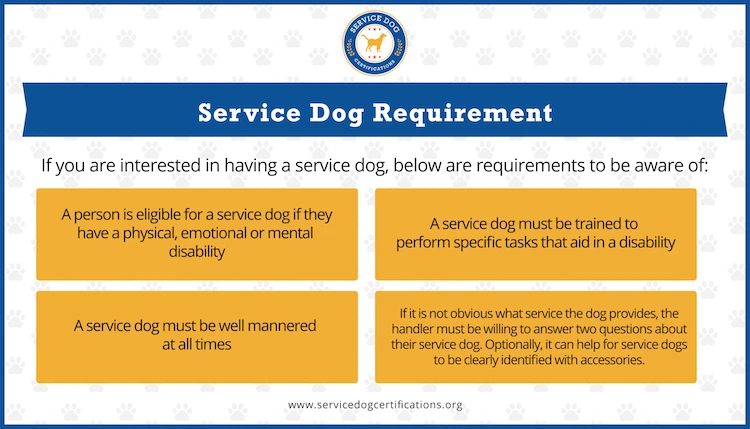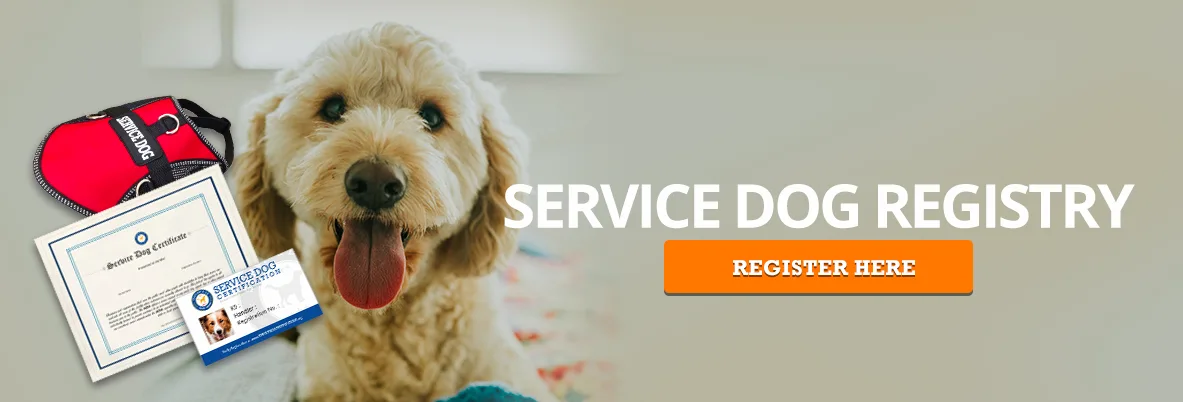How to Register a Dog as a Service Dog in Ohio

Service dogs are a lifeline for countless individuals with physical and psychological disorders. Acknowledging their critical role, Ohio has established regulations that safeguard the rights of service dog handlers.
In the Buckeye State, service dogs have the liberty to access public zones where animals are generally prohibited. Furthermore, they are allowed in housing units where ordinary pets might not be accepted.
In this detailed guide, we’ll outline the rights of service dogs in Ohio, the eligibility criteria for handlers, and what the registration process means.
Who Qualifies to Handle a Service Dog in Ohio?
Service dogs transcend the realm of traditional pets. They’re designated assistance animals serving individuals with disabilities. As defined by the Americans with Disabilities Act (ADA), a person with a disability is someone:
“who has a physical or mental impairment that substantially limits one or more major life activities.”
To be eligible in Ohio, the handler should be diagnosed with a physical or mental health disability, and the dog must be trained – either by the handler or a professional – to carry out specific tasks associated with the handler’s disability.
Such skilled canines perform jobs like guiding blind people, offering therapeutic support for psychological disorders, or aiding mobility by pulling wheelchairs. Dogs that assist with mental health-related disabilities are typically called psychiatric service dogs.

Understanding Service Dog Registration in Ohio
Is a Service Dog Registration necessary? No. In Ohio, there’s no legal obligation to register service dogs. While there’s no requirement for proof of registration to ascertain your service dog’s status, many handlers opt for voluntary database registrations to attain ID cards.
Handlers often employ badges like vests, ID cards, or certificates to underscore their dog’s specialized status. These markers play a pivotal role in distinguishing a regular pet from a trained service dog, reducing unwarranted interrogations in areas usually off-bounds to pets, and ensuring the dog remains undisturbed.
However, it’s crucial to discern that these items aren’t official proof of a dog’s service status. And nobody should require these accessories for entry. They serve mainly for the handler’s convenience when facing the public.
In Ohio, if the role of the service dog isn’t instantly recognizable, third parties are limited to two questions:
- Is this dog required for a disability?
- What job or task has the dog been trained to execute?
Once these questions are answered to everyone’s satisfaction, an Ohio service dog handler should be accorded unhindered access to public locales without necessitating any documentation.
Also, we should note that while Ohio doesn’t require any specific service dog registrations, all dogs must be registered with the appropriate county. Service dogs are not excluded from this requirement. However, service dog owners are exempted from paying registration fees. Registrations for dogs that are service dogs in Ohio are permanent and not subject to annual renewal.
Here’s the step-by-step process to enroll a service dog with SDC in Ohio:
- Verify your status as a service dog handler.
- Input details of the service dog and handler.
- Provide your email for communications and digital ID dispatch.
- Upload a current picture of your service dog.
- Explore and select auxiliary items like additional ID cards, tags, vests, etc.
Ohio Service Dog Training Standards
To earn the title of a service dog, meticulous training tailored to their designated tasks is imperative. They must also exhibit exemplary demeanor and restraint in public environments.
The three main avenues for training include:
- Adopting an already-trained service dog.
- Engaging a professional for customized training.
- Undertaking self-training which also fosters a profound bond between the handler and canine. But only consider this if you’re already adept at training a dog.
Laws About Service Dogs in Ohio
Beyond the federal provisions of the ADA, Ohio has its own set of statutes that fortify the rights of service dog handlers.
Ohio law, specifically ORC 955.43, permits persons with disabilities to be accompanied by their service dogs in all public places. However, there are some quirks in Ohio law that are not consistent with federal ADA rules. For example, the Ohio definition of “assistance dog” only covers a person who is blind, deaf or hard of hearing, or mobility impaired.
However, ADA rules likely preempt the Ohio rules. That means, for example, the Ohio requirement that an “assistance dog” be leashed is probably overruled by the more flexible ADA standard. Same with the Ohio requirement that the dog be trained by a nonprofit special agency. The ADA permits the training of service dogs with the help of a professional or without any outside assistance. Psychiatric service dogs are also recognized by the ADA and, therefore, in Ohio, even though the Ohio statute neglects to mention them.
In Ohio, falsely portraying a pet as a service animal is a violation that can lead to penalties. Upholding integrity and honesty is fundamental in cultivating mutual trust between the general public and legitimate service dog handlers.
Businesses can face lawsuits for not following service dog guidelines. In one case, a disabled veteran settled a lawsuit against a health services provider in Cleveland after staff allegedly refused to perform an examination because of the veteran’s service dog.
Ohio’s Service Dog Updates
Recently, in Ohio, the U.S. Attorney recognized the observance of Service Dog Awareness Week and reminded the public of the valuable contributions that service animals make. The Attorney’s Office highlighted the federal laws that protect these animals and those who use them.
Conclusion
Ohio is a state that is committed to the rights of service dog owners, ensuring that handlers and their canine partners are treated with the dignity and privileges they are entitled to. If you’re a service dog handler in Ohio, you can be confident about your rights whenever you’re in public.
About the Author: The writing team at Service Dog Certifications is made up of folks who really know their stuff when it comes to disability laws and assistance animals. Many of our writers and editors have service dogs themselves and share insights from their own experiences. All of us have a passion for disability rights and animals.
Related Articles

Hipster Dogs: Trendy Pups, Beards, and Beanies
From PBRs to beanie caps, and from plastic sunglasses to “pawsome” music, hipster dogs have taken the world by storm — and there’s no turning back. Because, let’s face it, these little guys and gals were rocking the style before it was cool — not that they would care what’s cool, though. For a “pawsitevly” […]

Read More

How Dogs Can Calm Anxiety
A person suffering from anxiety attacks experience many risks, and it’s one of the reasons why it’s prudent to consider having a service dog or emotional support animal as a companion. The animal can keep the environment safer for the individual and below are some of the ways a dogs can calm anxiety: 1) Dogs […]

Read More

Can Cats Be Service Animals?
Having a cat brings the same positive effects as dogs. These pets can be equally beneficial to a person’s health. Experts have proven that cat owners are less likely to have a health emergency, such as a heart attack, with their feline companion around and cats have also been proven to help alleviate sleeping disorders, […]

Read More



I’ve trained my own dog to be an ESA dog does your business hande ESA dog’s?
You don’t need any special training for a dog to become an emotional support animal. You do however need an ESA letter from a licensed healthcare professional, which you can read more about here: https://www.servicedogcertifications.org/esa-letter/
ESA’s and Service Dogs are two different categories. You can get the document for your providers (PCP or Therapist) to sign online. Everything else as far as the laws are almost similar at least in Ohio.
It is correct that service dogs and ESAs are two different categories of assistance animals, but they have very different legal rights. ESAs only have housing rights, while service dogs have travel rights, housing rights and public access rights. To qualify for an ESA, you need a signed ESA letter from a licensed healthcare professional. No such documentation is needed for a service dog.
I’d like to get another registration form this company.
You can register an emotional support animal here, but you should first get an ESA letter if you don’t have one already. An ESA letter is how you qualify your pet as an ESA in Ohio. Registration is an optional, but not mandatory step.